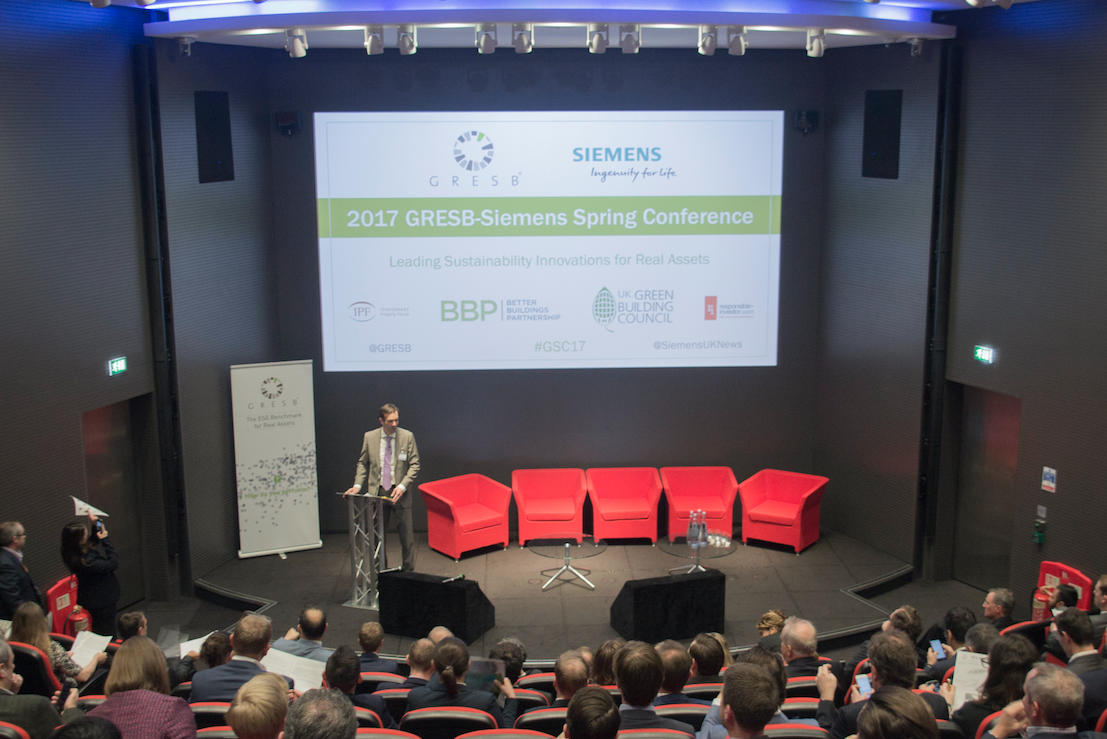 The first annual GRESB Spring Conference took place last week at the Crystal in London, hosted by Siemens, and those of us who were there are still processing the many insights and takeaways from the event.
The first annual GRESB Spring Conference took place last week at the Crystal in London, hosted by Siemens, and those of us who were there are still processing the many insights and takeaways from the event.
The venue was full of inspiring people — attendees, presenters and moderators — all gathered in one place. The combined energy of the group could be felt in the auditorium seats, over coffee and during the networking drinks in the lobby.
The program was arranged in three topical tracks:
- Climate Risk and Resilience – where we got clear about the challenges we are facing as an industry.
- ESG Solutions in Real Estate – where we took a deep dive into ESG solutions helping us mitigate climate risks.
- Impact of Digitalization – where we looked at the impact of digitalization on the real estate sector.
Here are 4 takeaways from the event, inspired by the beautiful building we were in, shaped by the speakers and discussed during the panels.
1) We must be long-term optimists
Let’s be honest … there’s still a lot of short-term thinking going on in the industry. In our everyday lives as investors, asset owners, fund managers and consultants, it’s easy to lose track of what our long-term goals and responsibilities are while having to meet targets over shorter time-frames.
Despite this, the message from the presenters was encouraging. We were told that we can’t be afraid or daunted by the challenges we are facing. That ESG is not a short-term program, it’s a long-term strategy with sustainable real assets and resilient capital markets as the end goal. And that our best move is to be long-term optimists – making our day to day decisions, setting our interim targets – but with the end goal always in sight.
2) We can’t forget the basics
We learned about the importance of scientific evidence and science based targets to make things real for people and to get buy in through the whole chain from developers, investors, managers and tenants. But at the same time, we heard that we need to keep things simple and to stick to the basics.
So before we chase down the next big idea and before we bolt on a shiny new program we should ask the fundamental questions and revisit the basic information about how our buildings are being managed – otherwise we could be missing the mark.
3) Getting good data is imperative but it’s (still) all about the people
We learned about the remarkable technology now available that allows us to optimize our buildings – driving savings and improving transparency. To add to that, we heard about the potential of cognitive buildings, machine learning and the IoT to help us move towards sustainability.
It’s clear that large amounts of data can turn into value for building owners and tenants and we heard many success stories from our speakers. And yet, we also learned that data doesn’t matter very much if we don’t get the human element right.
If we can use digitization to influence human psychology and if we can use data to tell creative stories that match the motivation of our stakeholders, then we’ll have amazing impact.
4) The ultimate takeaway
Events like last week, bring our community together, help us get out of our silos and stimulate dialogue between all market players – not just the “sustainability advocates”. For ESG to be fully embedded we can’t rely on a few skilled people, but the builders, owners and users of our buildings must also be empowered and involved. The data our buildings generate needs to mean something to all stakeholders and not just to a few analysts. In short, we must all speak the same language and have the same goals. GRESB has an important role to play in making this connection.
In addition to our September Annual GRESB Assessment Result Launches around the world, we are planning to develop multiple, regional Spring Conferences in 2018. Our goal will be to bring more voices into the conversation, particularly from fund managers and our institutional investor and bank members.
We’re all on this journey together. A journey to stimulate a market transformation. We invite you to continue along the journey with us.
Thank you to Siemens for hosting us at the Crystal. Thanks also to BPP, the UK Green Building Council, IPF, Responsible Investor and INREV for their support. And thanks to all the presenters for the great presentations.
If you missed it, review more highlights on Twitter with a search for #GSC17, and review the presentations on Slideshare.
The presenters and moderators at the event were the following:
- Sander Paul van Tongeren, GRESB
- Mark Jenkinson, Siemens
- Sarah Ratcliffe, BBP
- Prof. Dr. Sven Bienert, Regensburg University
- Tatiana Bosteels, Hermes Investment Management
- Andrew Rich TH Real Estate
- Miles Keeping, IPF
- Alastair Mant UK-GBC
- Terri Wills, World GBC
- Caroline Hill, Land Securities
- Simon Cox, Prologis
- John Davies, Derwent London plc
- Niko Kavakiotis, Siemens UK
- Ragnar Martens GRESB
- Tobias Huber, Siemens
- Keith Gunaratne, EP&T
- Claire Penny, IBM
- Benjamin Kott, EnergyDeck
This article is by Claudia Gonella, Director of Marketing & Communications at GRESB.